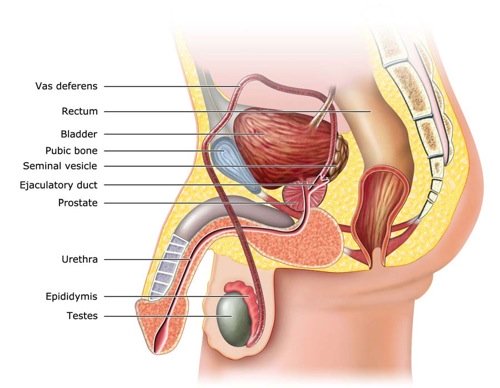
A Prostate Examination Will Give You Info about Prostate Problems in Men
A typical prostate examination consists of the infamous digital rectal examination where your doctor inserts a gloved finger up your rectum to feel the consistency of your prostate gland. While not a man's favorite, it will give your health care practitioner a good idea as to your prostate gland health. For more on this prostate check please go to:
Other exams for men's prostate health include:
- Prostate PSA Test, which is actually a PSA blood test.
PSA is short for prostate specific antigen. For more information on PSA testing and the controversy surrounding it, click below.
- Prostate Needle Biopsy, an invasive prostate examination, is usually the next stage after high levels of PSA are found. For further information on the adverse effects of the prostate needle biopsy, go to:
- Cystoscopy Prostate Examination is done only if your doctor suspects there is a serious problem. Your urologist will insert a camera catheter up through your penis all the way through the urethra into the prostate gland and then the bladder to see what’s going on inside them. This test should be done under local anesthesia (ask for it if not offered). For further reading, please go to:
- Urodynamic Testing is for patients with BPH or suspected BPH. The test is used to measure the amount of urine in the bladder, pressure and flow evaluation. The three main tests are described below.
Uroflowmetry: It's used to evaluate and record urine. Patients with a full bladder will pee into a device that measures the volume of pee, how long it takes and the rate of flow. It also evaluates the obstruction. My book Healthy Prostate describes how you can do this simple prostate check at home.
Pressure-Flow Studies: The Pressure-Flow Studies test measures the pressure of the bladder while urinating with a catheter inserted into the penis. It's the most accurate way of detecting and evaluating urinary blockage.
Post-Void Residual Test: Its purpose is to measure how much pee is left after urination. This is determined by either catheterization or ultrasound. Don't be surprised if your doc asks you to repeat the test — this is common as stress or anxiety can affect the results. Use deep, slow breathing before the test to try to prevent a repeat.
Other Prostate Exams:
Urine Test
While standard urine tests may help diagnose prostate problems by screening for blood or infection, chemical urine tests will also check for liver, diabetes or kidney disease.
Hyperplasia Intravenous Pyelogram
Hyperplasia intravenous pyelogram (IVP) involves an intravenous dye that is injected into major veins. This dye enables pictures of organs to be taken with a CT scan while the dye moves around. This test may be useful for men who have an enlarged prostate, as it looks for abnormalities in the kidneys, bladder and ureter tubes, which drain the kidneys.
Bladder Ultrasound
A bladder ultrasound is a non-invasive procedure that doesn't require a hospital visit. Its purpose is to determine if and how much urine is left after urination, which in turn may indicate an enlarged prostate.
Prostate Ultrasound
A prostate ultrasound can estimate the size of the prostate and is important if a biopsy is being recommended.
Radionuclide Bone Scan
If staging reveals that the prostate cancer has spread into the lymph nodes, then bone cancer often follows. A radionuclide bone scan is only used if PSA levels are above 10 ng and the patient experiences bone pain.
Computed Axial Tomography
If cancer looks aggressive or if the patient has a high PSA level, then a computed axial tomography (CAT) is used to see if cancer cells are present in other parts of the body or “metastasized”.
Magnetic Resonance Imaging
If the prostate cancer hasn't spread, it's unlikely this test would be necessary. An MRI uses a strong magnet linked to a computer to take detailed pictures of the prostate gland (as well as other organs and tissues in the body).
Pelvic Lymph Node Dissection
This test is used as a final confirmation of whether or not the prostate cancer has spread. It can be done either in open surgery or, more commonly, is done with a fiber optic probe inserted through a tiny incision in the abdominal area.

Prostate Examinations You Should Avoid
- Prostate Needle Biopsy: A Prostate Biopsy is a very
controversial prostate examination because of the risks of infection or,
if cancer is present, the spreading of the cancer to other parts of the
prostate or beyond to areas outside of the prostatic capsule. Please go
to the link on Prostate Needle Biopsy for more information but I will leave you with this to check out -
The BBC wrote this about a study done by the British Medical Journal:
As many as 50 percent of all prostate cancer diagnoses may be cases of over-diagnosis, according to a study published in the British Medical Journal.
Over-diagnosis refers to the detection of a cancer that, if left untreated, would never have any negative effects on a person's life. This happens with cancers that grow slowly and do not spread to other organs, so that a patient dies of other causes before ever experiencing any symptoms.
Click here for the full BBC article: "Experts scrap prostate screening proposal".
- Prostate PSA Test:
The New York Times reported on two studies from the New England Journal
of Medicine, one involving 182,000 men in Europe and the other
involving 77,000 men in the US:
Dr. Peter B. Bach, a physician and epidemiologist at Memorial Sloan-Kettering Cancer Center, says one way to think of the data is to suppose he has a PSA test today. It leads to a biopsy that reveals he has prostate cancer, and he is treated for it.
There is a one in 50 chance that, in 2019 or later, he will be spared death from a cancer that would otherwise have killed him. And there is a 49 in 50 chance that he will have been treated unnecessarily for a cancer that was never a threat to his life. Prostate cancer treatment can result in impotence and incontinence when surgery is used to destroy the prostate, and, at times, painful defecation or chronic diarrhea when the treatment is radiation...
The benefits of prostate cancer screening, he said, are ‘modest at best and with a greater downside than any other cancer we screen for.’
To read more, visit this site: "Prostate test found to save few lives".
Click here for more information about the PSA prostate examination.
Return from Prostate Examination to Home Page
Got a Question or Comment about your Prostate Health?
This is the place to post them because I get them immediately.
I like to share them and the answers I provide so others can benefit too.
Your email is kept completely confidential. If you want to be notified when the question is answered, please make sure to add your email address. I don't collect or store these emails after they are used to send you your answer, and they are not posted with your question.
What Other Visitors Have Asked or Said
Click below to see contributions from other visitors to this page...
Is prostate surgery the only solution to an enlarged prostate?
I've had two bad experiences with my urologists. Both seemed to persuade me to believe that surgery is the best option of the three choices: TURP Surgery, …
Prostate Pain
Hello,
I saw blood in my semen two-three years ago. It was present for weeks, then disappeared.
I have started to feel painful sensations in the …
Sleep Secrets by the author of this website.

Written by Ronald M Bazar,
~BCom, McGill University
~MBA, Harvard University
~the author of this website.

New Books by Author of This Site
Note Dear Reader...
You must change your diet by stopping those foods that are triggering your condition and replacing them with new ones that nourish you and your prostate.
Then combined with a high quality supplement, you are putting yourself on the road to healing.
There are no shortcuts. Just good changes and little by little you will get better. My books and this site tells you how.









